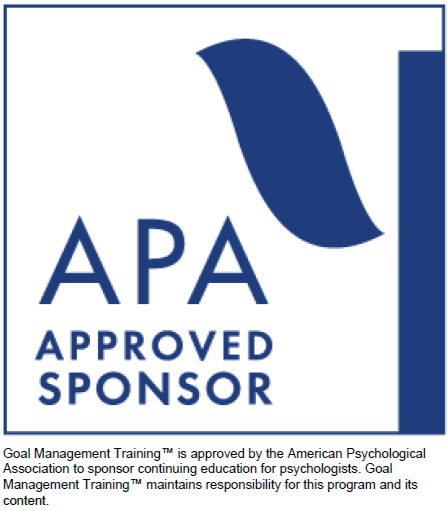Goal Management Training™
Goal Management Training™ (GMT) is a cognitive rehabilitation program grounded in neuroscientific principles, designed to help individuals with impairments in executive functioning improve their organization and ability to achieve goals.
A cognitive rehabilitation program grounded in neuroscientific principles
Designed to help individuals with impairments in executive functioning improve their organization and ability to achieve goals.
- traumatic brain injury
- stroke
- multiple sclerosis
- mild cognitive impairment in aging
- ADHD
- PTSD
- substance abuse
- and other conditions
How to become a GMT Therapist
Click on the button below to learn about how to become a GMT Therapist
Frequently asked questions
What are executive functions?
Executive functions are a collection of higher level cognitive abilities that support decision making, planning, attentional focus, and error correction. Executive functions are associated with the frontal lobes of the brain, but they are mediated by distributed networks across the brain. Individuals with executive function have impairment difficulty completing tasks efficiently both at home and on the job.
What is the purpose of GMT?
The main objectives of GMT are to train individuals to periodically “STOP” what they are doing, attend to task goals, evaluate their performance, and monitor or check outcomes as they proceed. GMT principles are derived from clinical and neuroscientific research concerning attention and keeping goals in mind. Training and practice of these steps improves the ability to withstand interference from distractions and to efficiently achieve chosen goals.
How is GMT administered?
GMT is structured into nine modules, with interactive discussions to raise awareness of various aspects of goal management, tasks that illustrate goal management concepts in action, and homework assignments to facilitate the transfer of concepts to real life. Modules are typically administered in group or individual weekly sessions ranging from 1-2 hours in length, with additional communications and therapist interactions over the course of training.
A new adaptation of GMT – GMT Foundations – is available for settings or applications where a nine-week course is impractical.
A new adaptation of GMT – GMT Foundations – is available for settings or applications where a nine-week course is impractical.
Who can administer GMT?
GMT can be administered by a qualified therapist who has completed GMT certification (through our new eLearning course or a prior workshop) and who has purchased the GMT materials (GMT Digital Tools or kits). Baycrest provides training and materials for how to administer GMT, but we do not provide general training on psychotherapeutic or rehabilitation interventions. Only qualified therapists who are registered / licensed health care providers in their jurisdiction can administer GMT. GMT therapists typically practice occupational therapy, psychology, or rehabilitation, among other disciplines. Advanced knowledge of the cognitive science or neuropsychological theory is helpful, but not required for GMT administration.
Who can benefit from GMT?
GMT was originally developed for patients with executive function impairment due to traumatic brain injury, age-related cognitive changes, and stroke. It has since been applied in over 60 studies, including multiple sclerosis, spina bifida, post-critical care cognitive impairment, ADHD, PTSD, and other conditions. More recently, GMT has been used to treat cognitive deficits in mental health conditions such as depression, PTSD, OCD, substance abuse, and schizophrenia, as well as in disabled workers. In general, all of these conditions cause executive function impairment due to effects on the brain's frontal lobes or distributed systems across the brain, which in turn compromises attentional processing. GMT is being actively used in numerous research trials internationally.
History of GMT
GMT was conceived in the mid-1990s by Ian Robertson at the UK Medical Research Council (MRC) at Cambridge University (now Cognition and Brain Sciences Unit; CBU). Dr. Robertson is now at Trinity University, Dublin, Ireland. It was expanded into its current format by Brian Levine of the Rotman Research Institute at Baycrest and Tom Manly of the CBU. The effectiveness of GMT has been supported in over 60 publications in peer-reviewed journals. With the support of Baycrest, GMT was made available for purchase by qualified clinicians and researchers in 2012. The French translation of GMT (also available for purchase) was published in 2019.
Encyclopedia entry
Encyclopedia entry
About Baycrest
Baycrest is a global leader in aging and brain health. Baycrest offers unparalleled experience and breadth in geriatric residential living, healthcare, research, innovation and education, accumulated over more than 100 years. Baycrest envisions a world where every older adult can realize their potential throughout the aging journey and experience a life of purpose, inspiration and fulfilment. Through its extensive programs and services, Baycrest is working to defeat dementia and pave the way for better aging.
Write your awesome label here.


